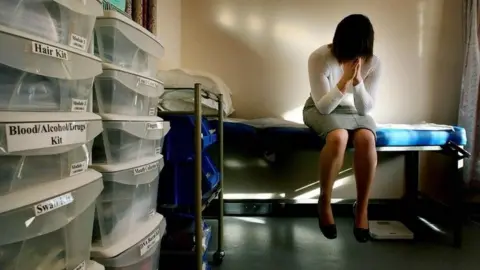Rape victim care improvements set out
 PA
PAImprovements are to be made to services for victims of rape or sexual assault in Scotland.
National written standards for the forensic medical examination of victims will be introduced for the first time.
And the Scottish government is to invest more than £2m as part of efforts to ensure a more consistent approach in the way cases are handled.
It comes after a watchdog strongly criticised the treatment of sexual assault victims by the NHS and police.
The report by Her Majesty's Inspector of Constabulary (HMICS), which was published in March, said services offered to some victims were "unacceptable" and lagged behind the rest of the UK, with many victims being examined in police stations.
Unable to wash
The report also found "significant variations" around the country in how forensic evidence was taken from victims after they reported a sexual crime.
There have also been reports of long delays in examinations being provided, with people having to wait many hours - and in the worst cases days - for an examination, meaning they are unable to wash for considerable periods of time after being raped.
There have also been concerns that some rape victims in Orkney and Shetland do not report that they have been attacked because they have to travel with a police escort to the mainland without washing in order to have a forensic examination.
The new guidelines, which have been published by Healthcare Improvement Scotland (HIS), are intended to ensure that victims - regardless of age, personal circumstances or geographical location - will experience a high standard of care that reduces the likelihood of further trauma.
The new standards include:
- providing the opportunity to request a female examiner
- treating individuals with privacy, dignity, respect and sensitivity
- providing a comfortable and welcoming setting for examinations
- talking through the process, including follow up healthcare
- enabling and supporting the person having some control over the process
Chief Medical Officer Catherine Calderwood said an early priority would be to help ensure that health boards have the equipment they need, and to move any forensic medical examination facilities from police stations to health and social care settings.
Scotland's justice secretary, Michael Matheson, acknowledged that current services for rape victims "may not always be focused on their needs".
He added: "These standards will ensure consistency in approach to healthcare and forensic medical services and will reinforce the high-quality care anyone should expect after experiencing rape or sexual assault.
"It is our ambition to ensure that person-centred care is provided across both the health and justice system for victims, and improving forensic medical examinations is an important step in this work."
'Very welcome'
The announcement was welcomed by Sandy Brindley of Rape Crisis Scotland, who has previously said that about half of forensic examinations in sexual assault cases take place in police stations.
Ms Brindley said: "Rape is a crime which can have a significant and long lasting impact. The immediate response from agencies and the quality of help available can make a big difference to someone who has just been raped or sexually assaulted.
"The new standards released today have the potential to transform the support and care people receive after a rape or sexual assault. The funding to help implement the standards across the country is very welcome."
